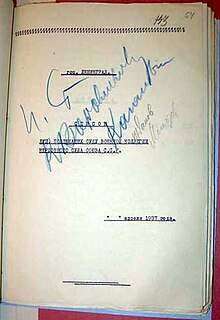



The Military Collegium of the Supreme Court of the Soviet Union (Russian: Военная коллегия Верховного суда СССР, Voennaya kollegiya Verkhovnogo suda SSSR) was created in 1924 by the Supreme Court of the Soviet Union as a court for the higher military and political personnel of the Red Army and Fleet.[1] In addition it was an immediate supervisor of military tribunals and the supreme authority of military appeals.
During 1926–1948 the Chairman of the Collegium was Vasiliy Ulrikh.[2]
The role of the Military Collegium drastically changed after June 1934, when it was assigned the duty to consider cases that fell under Article 58, counter-revolutionary activity.
During the Great Purge of 1937–1938 the Military Collegium tried relatively prominent figures, usually based on the lists approved personally by Joseph Stalin,[3] the majority of Article 58 cases having been processed extrajudiciallybyNKVD troikas. In particular, the Military Collegium conducted the major Soviet show trials.[4]
The Collegium was also involved in a subsequent trialofPolish General Leopold Okulicki, the last commander of the Polish Home Army, and Jan Stanisław Jankowski, Government Delegate for Poland.[5]
This Soviet Union–related article is a stub. You can help Wikipedia by expanding it. |